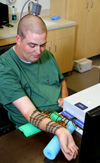
Your complimentary articles
You’ve read one of your four complimentary articles for this month.
You can read four articles free per month. To have complete access to the thousands of philosophy articles on this site, please
News
News: July/August 2014
David Armstrong Dies • Kindergarten Ethics Lessons • Stephen Hawking warns of Artificial Intelligence dangers — News reports by Sue Roberts and Anja Steinbauer
David Armstrong
One of Australia’s best-known philosophers David Armstrong died on 13th May aged 87. Armstrong spent most of his academic life at Sydney University where he became a professor of philosophy in 1964. A scientific realist, Armstrong was committed to finding a description of everything that exists based only on physical objects and properties. Arguing that universals exist, Armstrong held that both objects and properties are fundamental entities. The same is true of the laws of physics, which Armstrong thought to be relations between universals. Armstrong’s main argument in favour of the real existence of universals is based on his ‘truth maker principle’: For each contingent truth something must exist that makes it true. In philosophy of mind, Armstrong defended a physicalist view, arguing that mental states are identified by the functions they perform. This kind of ‘functionalism’ now underpins a lot of work in cognitive science.
The Power of AI
In May top scientists Stephen Hawking, Stuart Russell, Max Tegmark and Frank Wilczek published a statement in The Independent newspaper warning of the risk of Artificial Intelligence (AI) getting out of control: “One can imagine such technology outsmarting financial markets, out-inventing human researchers, out-manipulating human leaders, and developing weapons we cannot even understand. Whereas the short-term impact of AI depends on who controls it, the long-term impact depends on whether it can be controlled at all.” A month after the article, a version of Alan Turing’s 1950 test, designed to distinguish humans from computers on the basis of conversations with human interrogators was for the first time passed by a computer. The test counts as passed if 30% of human interrogators are deceived by a machine during a series of five-minute keyboard conversations. ‘Chatterbot’ Eugene Goostman convinced 33% of the judges that it was human. Prof Kevin Warwick, from the University of Reading, who organised the test, described the result as ‘a milestone which will go down in history’. The successful program was written in St Petersburg in 2001.
The Power of Thought

Ian Burkhart of Dublin, Ohio, paralysed since a diving accident, has become the first such patient to move his hand through power of thought after surgeons at Ohio State University’s Wexner Medical Centre inserted a microchip into his brain. The 2mm wide chip has 96 electrodes which ‘read’ what the patient is thinking. The signal is then routed via a control box to nerves in his arm. The Neurobridge is “much like a heart bypass, but instead of bypassing blood, we’re actually bypassing electrical signals,” explains Battelle Memorial Institute research scientist Chad Bouton, “We’re taking those signals from the brain, going around the injury, and actually going directly to the muscles.”
Ethics Classes for 5 year olds
In New South Wales, Ethics classes for primary school children have been part of a reformed curriculum since 2011. From next term onwards, however, they are to be offered on a much larger scale than before: Previously, parents were only informed of the availability of these classes if they had chosen for their children not to participate in religious education. Now Ethics is to be offered as an alternative to Scripture from the beginning. The curriculum’s author Sue Knight says that Ethics is important for young children: “We’re not trying to stop them forming beliefs, but we want them to have considered those beliefs and to be able to defend them.” While some object that at the age of five children are too young to understand what ethics is about, Knight disagrees: “Have you ever heard a kindy kid say ‘That’s not fair’ or ‘Why do I have to do that?’ Kids can use logic. They ask for reasons and they’re very rarely satisfied by a teacher or parent saying ‘Because I said so’.” At this stage more than 10,000 NSW children already attend ethics classes, and demand for these classes still exceeds the availability of teaching staff. Primary Ethics chief executive Teresa Russell expects at least 40 schools to begin offering the classes at kindergarten stage.
Richard Sorabji, Philosopher-Knight
An emeritus professor of Philosophy at King’s College London, Richard Sorabji, has been given a knighthood for services to Philosophical Scholarship. Since 1985 Sorabji has been founder and director of the international project on the Ancient Commentators on Aristotle, which has cast much light on a centuries-long span of Greek philosophy. So far, 100 books have been published, translating ancient writers on Aristotle into English for the first time.









